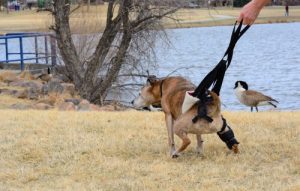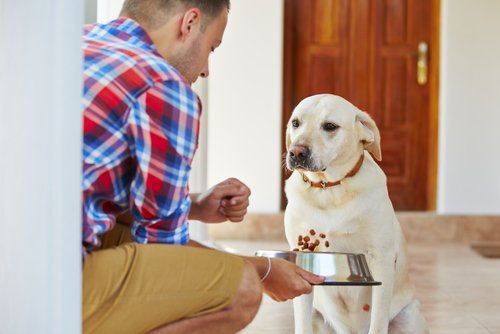Recommended diet for dogs with kidney failure


Written and verified by the vet Eugenio Fernández Suárez
Kidney failure is so common in dogs that it’s one of the most frequent diseases found in elderly dogs. This condition has a lot to do with their diet, so it’s important to make sure their diet meets all requirements to nourish the kidney.
Characteristics of the disease
Renal failure causes kidneys not to function completely, which has multiple consequences on the body. The kidney is in charge of filtering different toxins and wastes in the blood.
Although kidney failure takes place for multiple reasons — such as circulatory problems or toxins — renal failure is most common in elderly dogs. Usually, they are affected chronically due to the kidney wearing down and other diseases like hypertension or diabetes.
Fortunately, dogs have two kidneys. So, a dog with kidney failure can survive due to another healthy kidney. However, he must acquire a healthy diet to prevent complete renal deterioration.

Consequences, diagnosis, and treatment
The urine of dogs with renal failure isn’t very concentrated. They often are thirsty, and will probably lose weight due to their loss of appetite. Likewise, they may even have more serious symptoms, such as vomiting and ammonia breath, which is sometimes confused with a urinary tract infection.
Go immediately to the vet if you suspect your dog has renal failure. He/she will run a blood test to properly diagnosis the disease and provide advice you can follow.
Even though using IVs, dialysis or even transplants are options for kidney failure, the diet has to be changed to reduce the pressure on the kidney.
Dietary tips
Due to the diet being one of the most important factors in treating kidney failure, it’s important to follow some guidelines for controlling your sick animal’s nutrition.

This diet should hydrate your dog through wet food and a good water intake. Also, you should be very careful with the minerals like sodium and phosphorus, and nutritional elements like proteins. All of them should be taken in limited amounts. However, proteins are very necessary, so make sure they are high quality.
As for commercial dog food, there are many commercial brands that make food for elderly dogs. Another option is to provide your dog with a homemade diet that follows your vet’s guidelines.
Your dog’s food should never be salted and should be low in phosphorus. So, that means you should avoid giving him liver, fish, cheese, dairy or beans. Boiled rice and meats like chicken can be a great option as long as they are part of the diet that your vet gives you. Even when it comes to eggs, make sure they have high-quality proteins that will nourish your dog’s kidneys.
It’s important that you don’t choose non-formulated dog food when dealing with this disease. Often, dog food has low-quality proteins that don’t even come from meat, and these can worsen your dog’s kidney condition. Sticking to the vet’s advice will allow your dog to live for many years, even if his kidneys are not in good shape.
Kidney failure is so common in dogs that it’s one of the most frequent diseases found in elderly dogs. This condition has a lot to do with their diet, so it’s important to make sure their diet meets all requirements to nourish the kidney.
Characteristics of the disease
Renal failure causes kidneys not to function completely, which has multiple consequences on the body. The kidney is in charge of filtering different toxins and wastes in the blood.
Although kidney failure takes place for multiple reasons — such as circulatory problems or toxins — renal failure is most common in elderly dogs. Usually, they are affected chronically due to the kidney wearing down and other diseases like hypertension or diabetes.
Fortunately, dogs have two kidneys. So, a dog with kidney failure can survive due to another healthy kidney. However, he must acquire a healthy diet to prevent complete renal deterioration.

Consequences, diagnosis, and treatment
The urine of dogs with renal failure isn’t very concentrated. They often are thirsty, and will probably lose weight due to their loss of appetite. Likewise, they may even have more serious symptoms, such as vomiting and ammonia breath, which is sometimes confused with a urinary tract infection.
Go immediately to the vet if you suspect your dog has renal failure. He/she will run a blood test to properly diagnosis the disease and provide advice you can follow.
Even though using IVs, dialysis or even transplants are options for kidney failure, the diet has to be changed to reduce the pressure on the kidney.
Dietary tips
Due to the diet being one of the most important factors in treating kidney failure, it’s important to follow some guidelines for controlling your sick animal’s nutrition.

This diet should hydrate your dog through wet food and a good water intake. Also, you should be very careful with the minerals like sodium and phosphorus, and nutritional elements like proteins. All of them should be taken in limited amounts. However, proteins are very necessary, so make sure they are high quality.
As for commercial dog food, there are many commercial brands that make food for elderly dogs. Another option is to provide your dog with a homemade diet that follows your vet’s guidelines.
Your dog’s food should never be salted and should be low in phosphorus. So, that means you should avoid giving him liver, fish, cheese, dairy or beans. Boiled rice and meats like chicken can be a great option as long as they are part of the diet that your vet gives you. Even when it comes to eggs, make sure they have high-quality proteins that will nourish your dog’s kidneys.
It’s important that you don’t choose non-formulated dog food when dealing with this disease. Often, dog food has low-quality proteins that don’t even come from meat, and these can worsen your dog’s kidney condition. Sticking to the vet’s advice will allow your dog to live for many years, even if his kidneys are not in good shape.
This text is provided for informational purposes only and does not replace consultation with a professional. If in doubt, consult your specialist.







